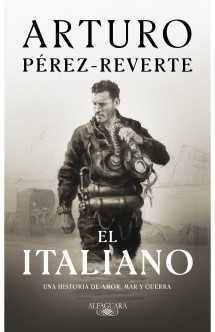Prensa > Críticas en otras lenguas
Críticas en otras lenguas
Críticas publicadas en otros idiomas.
The Spanish for swash
GUY FIORITA | The Times - 16/7/2005
Ask a spaniard to name a footballer and he will say Raúl,
Beckham or maybe Ronaldo. Ask for a film director and you'll get
anything from Pedro Almodóvar to Steven Spielberg. Ask for the name of a
famous soldier of fortune, however, and there is only one answer:
Captain Alatriste, the swashbuckling hero of the adventure series
written by Arturo Pérez-Reverte.
In Spain, Alatriste is a phenomenon comparable only with that of Harry
Potter here. Ever since the first book about the struggles of this
down-on-his-luck sword-for-hire appeared in 1996, Alatriste has become a
cult figure, with more than two million copies of the books sold in
Spain and another two million internationally.
Today, as well as the five Alatriste books, there are unofficial
Alatriste websites, comic strips, board games, figurines and even
Alatriste Walks around Madrid. Filming has just ended on a movie version
starring Viggo Mortensen. And now, at last, the first book of the
series has been released in English in Britain.
Pérez-Reverte is a celebrity in Spain and is the country's
best-selling author. A former TV war correspondent, he describes himself
as "a sailor and a reader who became a writer by chance". His 14
novels, including The Flanders Panel, The Dumas Club and The
Fencing Master, have been translated into 28 languages and there
have been movie versions of several, including Roman Polanski's The
Ninth Gate, and Uncovered (The Flanders Panel). Despite these
successes, Pérez-Reverte will always be remembered as the man who gave
us Captain Diego Alatriste y Tenorio.
Captain Alatriste, the first of the series, is an adventure novel set
in early 17th-century Spain - a time when the mighty Empire was
beginning to crumble as a result of disastrous wars and the rule of the
inept and decadent Felipe IV. After being wounded in Flanders, Captain
Alatriste returns to Madrid to make his living as a swordsman for hire.
Alatriste is at once brave, forthright and learned - but also something
of a womaniser, a heavy drinker and an assassin.
Which is, of course, all part of his charm. Our hero accepts a
commission to give a pair of travellers a scare. It soon becomes clear
that this is no ordinary job and Alatriste becomes involved in a
political conspiracy that reaches right to the courts of Europe.
Told by his faithful young page, Iñigo de Balboa, Alatriste includes a colourful cast, from the hard-drinking, hard-fighting poet
Francisco de Quevedo to the dangerously beautiful Angélica de Alquézar
and the feared Inquisitor Emilio Bocanegra.
Although we are fed a hearty diet of swash and buckle, Pérez-Reverte
never intended it to be "just an adventure. I wanted to pay homage to
the great adventure writers I read in my youth such as Alexandre Dumas,
Jules Verne and Daniel Defoe. Also, I had noticed that there were things
that I thought every European child should know and that were not being
mentioned in school. My daughter belongs to a generation in Spain that
is losing its historical memory. History is taught less and less, and is
being replaced by classes considered more practical, like computer
science. So I decided to try to do something to help my daughter's
generation rediscover a liking for history."
Pérez-Reverte spent more than 20 years as Spain's star war
correspondent, covering every important conflict from the Falklands to
the Gulf. The result is a thinking man's adventure novel, where sword
fights and tales of derring-do are interwoven with wonderful passages of
poetry and gems of historical and cultural information. "The idea is
that the book should be fun and exciting, but also make the reader
think. I wanted it to be a reflection on the people who build empires.
At that time the Spanish Empire was the most powerful in the world. Even
the US today is nothing compared with the Spain of that era and I
wanted to write a story of the men who went out to fight for the glory
of the country only to be betrayed by inept kings, corrupt politicians
and religious fanatics. Alatriste is about the tragedy of the
soldiers who built the empire."
Be warned, Alatriste is not for the faint-hearted. "When he
kills, he really kills," Pérez-Reverte says. "As a writer, I have the
dubious advantage of having seen horrible things. I understand violent
acts, cruelty, pain and vengeance because I have lived it."
The experience gives Alatriste a frank realism. "I know that
under a certain set of circumstances any of us could be raping and
pillaging tomorrow," he says. "That is why the good guys and bad guys in
my books are always very ambiguous. There is no clearly defined line
between good and evil there because in real life it doesn't exist
either."
The sixth book in the Alatriste series, The Vengance of
Alquézar, is due to be released in Spain next year. In 2007 another
is planned. "There will be eight to ten in total," PérezReverte says.
"That is, if I'm alive, healthy and still feel like it." Lovers of great
adventure everywhere can only hope for all three.





